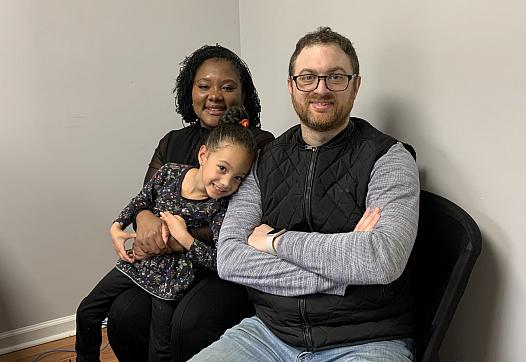A measure of care: Support is critical for expecting mothers
The story was originally published in The Charlotte Post with support from the 2022 Data Fellowship.

North Carolina, one of 11 states where Medicaid expansion has yet to occur, had an infant mortality rate of 6.77 per 1,000 births in 2020 – the eighth highest in the United States. South Carolina, which doesn’t have Medicaid expansion, has a rate of 6.64 per 1,000 births – 11th highest in the nation.
HUSH NAIDOO JADE PHOTOGRAPHY
After losing a child, Shakira Balerna and her husband, Steven, are not giving up.
Balerna, 36, is pregnant again. Her third child is due in May.
The death of a child before its first birthday is the very last thing a parent wants and is often hard to accept. But the good news is that there is hope after loss.
“It's great to have other women who are going through the same thing to understand that other people have gone through it, and that we're still thriving,” said Balerna, founder of Shakira Balerna Photography, a maternal photo studio. “There’s actually some positives that can happen afterwards and just keep going.”
In 2021, at 36 weeks of pregnancy, Balerna lost her second child, Halle to concealed placental abruption, a condition in which blood is retained behind the placenta and prevents oxygen from flowing to the baby.
“[Halle] was so important to us,” said Balerna. “I never want her to be forgotten and I want parents to feel comfortable talking about and still celebrating and loving that child that they lost. That's so important to me because I feel like the issue of infant loss or pregnancy loss can be taboo.”
Black babies are at greater risk of dying than their white counterparts in the United States. Without Medicaid expansion, infant mortality rates in North Carolina and South Carolina remain higher than the national average. In 2020, North Carolina’s rate – 6.77 per 1,000 births – was eighth in the nation, according to the federal Centers for Disease Control and Prevention. South Carolina’s rate of 6.64 per 1,000 births was No. 11 overall.
The North Carolina Child Fatality Task Force recently submitted its annual report to Gov. Roy Cooper with data on child deaths and recommended funding to prevent more deaths and promote well-being. North Carolina currently spends $97,000 per year on programs to prevent infant mortality, according to the report. However, that amount is not enough to cover education and outreach for parents and caregivers of more than 120,000 newborns per year to prevent sleep-related deaths. The task force is recommending the state increase funding to $250,000 per year, which is about $2.10 per baby.
The task force is recommending Medicaid funding to support maternal healthcare strategies that are proven to reduce adverse birth outcomes and health disparities. Funding would also go to expand efforts to prevent infant deaths related to unsafe sleep environments.
“Our statewide child fatality prevention system, which includes child death review teams in every county, needs to be restructured and strengthened to optimize the work of these teams and to ensure that information learned from reviews is effectively used at the state and local level to prevent future child deaths and to strengthen child well-being,” said Karen McLeod, the task force’s co-chair.
Mecklenburg County plans to spend a total of $700,000 this year on improving access to care, according to a statement released on the county’s website.
For the 2023 fiscal year, $55,000 will go to the Mind Body Baby Program NC, which connects expectant mothers with doula services and provides support within the first month of delivery. The county will spend $123,000 to hire more health educators to support maternal and child health.
North Carolina has an infant mortality rate of 6.8 and South Carolina 6.5, according to the nonprofit March of Dimes. If Medicaid was expanded in North Carolina, it could help reduce the high number of Black babies that die every year. It would also mean reimbursement for doulas who care for expecting families.
“We think it will be just awesome if doulas reimbursement was part of Medicaid so that is one of the things that the Child Fatality Task Force has supported,” Pettiford said.
Under Medicaid Transformation in North Carolina, health coverage was extended to pregnant women to 12 months after they give birth. Before, women were kicked off of their health insurance after 60 days.
In 2020, U.S. Reps. Alma Adams of Charlotte, Lauren Underwood, and then-Sen. Kamala Harris introduced the Black Maternal Health Momnibus Act to address the maternal health crisis. The 12-part bill designs a roadmap to make Black maternal and infant health a priority in the U.S.
One bill under the Momnibus Act, the Protecting Moms Who Served Act of 2021 has passed by both chambers of Congress and moved to President Joe Biden’s desk.
At the end of 2022, Adams secured hundreds of millions of dollars to North Carolina as part of the 2023 Federal Omnibus Bill, which provides federal funding in a series of bills. The bill included new programs to allocate funding for historically Black colleges and universities, minority serving institutions, maternal health, and community projects in Charlotte, Mecklenburg and Cabarrus counties.
“While I am disappointed that many specific Momnibus priorities were left out of the omnibus, especially those addressing social determinants of health, this bill includes many historic investments in maternal health that will save lives, including $7 million in awards to community-based organizations to achieve maternal health equity – an idea first proposed in the Kira Johnson Act,” Adams said in a statement.
According to a 2018 study by the National Institutes of Medicine, data showed infant mortality rates increased slightly in states that had not expanded Medicaid from 2014-16. However, research showed rates decreased slightly in states that had.
In 2020, South Carolina had a 7% decrease in infant mortality from 2019. However, the disparity between white and Black babies widened from 2016-20.
“SCDHHS welcomes the recent improvement in South Carolina’s infant mortality rate; however, there is more work to be done to further improve outcomes in the state,” said Jordan Desai, chief of quality for South Carolina Department of Health and Human Services. “Ensuring a healthy start to life for both the mothers and infants we serve is at the core of SCDHHS’ continuous quality improvement strategy.”
Republican Henry McMaster, South Carolina’s governor, has rejected Medicaid expansion and last year, the state left $2.2 billion in federal funding on the table.
“If the state were to expand Medicaid, it would not have a direct impact on coverage for children, pregnant women or women who are within their first 12 months postpartum,” said Jeff Leieritz, spokesperson for South Carolina Health and Human Services. “Medicaid expansion would provide coverage to non-disabled adults with household income up to 138% of the federal poverty level.”
If Medicaid was expanded in South Carolina, it could help an additional 345,000 residents access health insurance coverage.
Equity Before Birth, a nonprofit in Durham County that serves Black and brown families who are expecting, supports Medicaid expansion in North Carolina.
“I think it's a really good thing because of what we're hearing around the lack of access to really, basic prenatal and medical care,” Joy Spencer, executive director of Equity Before Birth. “We've seen families that are six and seven months pregnant who still haven’t had access to [an] ultrasound, and things of that nature. And so having that expansion would hopefully catch those families and enable them to get some of those services. It’s not gonna be a blanket solution or a one stop or the end all be all, but it’s baby steps.”
After the death of baby Halle, Balerna sought counseling at KinderMourn, a Charlotte nonprofit that helps bereaved parents. It offers individual and group counseling and provide counseling to children who have lost a loved one.
The Empty Arms program specifically helps bereaved parents after the death of a child during pregnancy.
“These are families that don't get to bring their babies home,” said Kaela O'Donnell, clinical director of KinderMourn. “We do an eight-week grief support group for them and they meet once a week and they're in a room with other families who have experienced the same type of loss. Obviously, everyone's loss is different and no one’s loss is exactly the same, but we just find with grief, one of the best things we can do is be in community with other people who are kind of walking in a similar journey.”
A parent never “gets over” the death of a child. Instead, they learn to move forward.
“I actually don’t utilize that language as far as getting over or moving on,” O’Donnell said. “I think that can actually be really painful and people say that a lot to grieving parents [and] any grieving person. There can be this pressure that they have to move on or get over it. Instead, what I believe is that you learn to carry your grief with you and maybe you are working towards moving forward.”
Last year, more than 1,300 individuals participated in counseling at KinderMourn. Sixty percent of the participants identify as African American.
Natalie C. Carter, who KinderMourn’s executive committee vice chair, is working to increase diversity among the families they serve.
“It's not the easiest thing to find counselors of color,” she said. “There’s a lot of reasons. In terms of just working on our recruitment, and then also working on our diversity on our board is something that I'm committed to and so this year I'll be focused on diversity.”
Balerna didn’t show the common signs of concealed placental abruption during her pregnancy.
During her last appointment, Balerna’s gynecologist had trouble finding the baby’s heartbeat, an early sign that something was wrong. She was assured everything was OK. Balerna reminded her doctor to switch her blood thinner medication. Without it, the chances of a fatal abruption would increase.
Balerna doesn’t want expectant mothers to experience the same mistreatment she faced from the health system. Her advice is to self-advocate.
“I think it is an important story to tell, just to bring awareness to some of the discrimination that Black women face in medical [care],” Balerna said. “Also, to bring awareness to women. I want them to know to advocate for themselves, to listen to the signs, and keep pushing until they give you the attention that you need.”
If you have lost a child of any age and you reside in Charlotte seek help at www.kindermourn.org.


